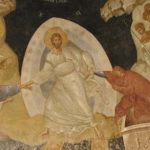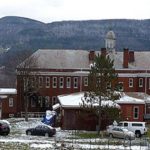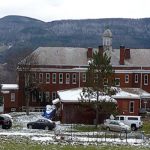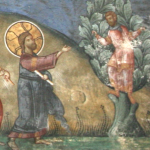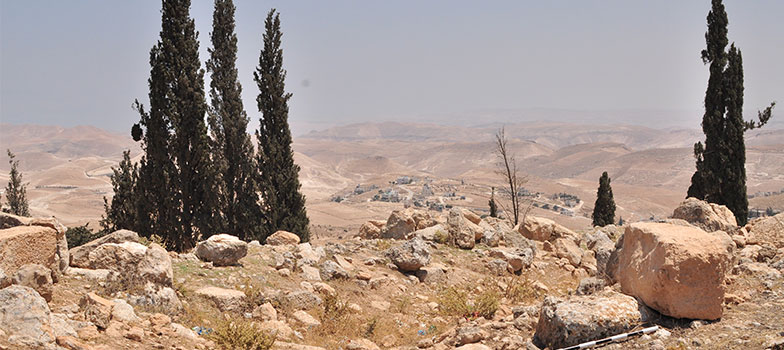
The Life of St Theognios
![]() Foreword
Foreword
The long life of Saint Theognios was written as a eulogy by Paul, the Hesychast of the city of Elousa, a disciple of the Holy Theognios. He delivered it in the Monastery of the Saint, over four years after the dormition of Theognios (522).
This summary of the life of Holy Theognios was based on the text of Paul the Hesychast, but we also used some information from the short text by the renowned Monk Cyril of Scythopolis, historian of Palestinian monasticism, named “The Life of Our Father Theognios the Bishop”. (The full text by Cyril is added at the end of this summary). The Monastery of Theognios, and its Abbot Paul, are also mentioned in the book called "Spiritual Meadow" by John Moschos (6-7th century).
The author of the life of St Theognios, Paul the Hesychast, on arrival from Greece to the Holy Land, was guided to Holy Theognios by the famous Abba Alexander, who was known as "the unblemished diamond of our generation". This Elder Alexander pointed out to Paul that Blessed Theognios was distinguished primarily for the cultivation of the virtue of Humility: "Because the generation of man is easily pulled towards arrogance due to vanity, for this reason we require teachers who not just by plain words but with actions cultivate the best virtue of Humility". As he pointed out, Abba Theognios cut off the two main causes of sin — self-indulgence and arrogance, “therefore,” he said to Paul, “if you meet Saint Theognios you will most definitely benefit from this and if you receive him as your Spiritual Guide, you will come to knowledge of God”.
Some of this benefit we too will also gain from the following life of the Saint.
Illustrations: ruins of the monastery of St Theognios, a new cell built on the top of the monastery hill.
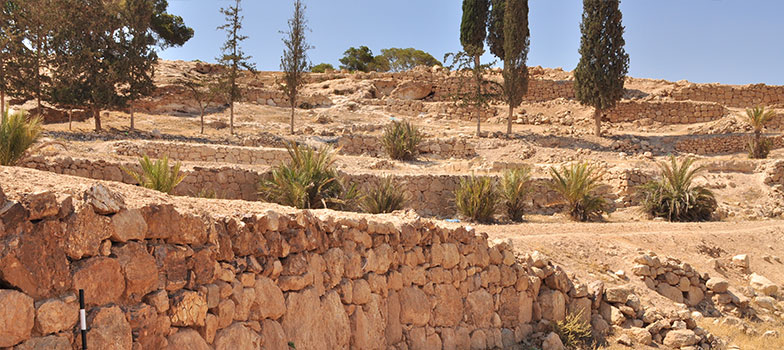
From Cappadocia to the Holy Land
Holy Father Theognios was born around the year 425 in Cappadocia of Asia Minor, in the city of Araratheia, as were two other great figures of Palestinian Monasticism, St Sabbas the Sanctified and St Theodosios the Cenobiarch. Even as a child, he followed the life of a monk, having gone through this time in peace and in conduct, which befits that of a monk. Taking heed of the commandment that Patriarch Abraham received from God: "Go out of your land and your family and come to the Land that I will reveal to you” (Genesis 12:1), as if he himself received that commandment, he abandoned his land and moved to Jerusalem in order to worship at all-holy sites.
At the Monastery of St Julian
In Jerusalem, Holy Theognios came to the Monastery of St Julian the Martyr, which was also called the Monastery of Flavia, at the Mount of Olives, near Gethsemane, because other monasteries were in the hands of the heretics, the monophysites. There he kept his practice of peace and meekness. The founder of the Monastery, Flavia, pleaded with him and urged him to accept the administration of the Monastery. Holy Theognios proved to be a worthy elder of the Monastery and the Brotherhood of Flavia, and attracted praise from all, for the Glory of God.
However, the distractions of many visitors and the needs of the Monastery, which had an abundance of goods, detached him from his peaceful prayer. Holy Theognios feared that perhaps the commotion, noise, needs and praise of the people would affect his thoughts and he would become unworthy of his heavenly calling. After visiting a wise Elder, he explained to him the situation and the Elder said to him: "Those to whom I see you belong, who want to protect their souls without obstacles for the greater good, don’t involve themselves in such distracting cares. Even if things like property assets seem to suit monks; but it would be better to leave these things to skilful people who can endure distractions without being harmed. As for those who seek to acquire the virtue of peaceful prayer, they take care to avoid even contact with many people so that the candle light is not hidden in the shadow of the bed or under the basket (Mark 4, 21), because the bed and the basket symbolize laziness and love of material things. Many times the bright light was blown out by a strong wind that blew suddenly. If you want to heed my words, leave from here and go and reside in the desert.”
Then Theognios replied: "I greatly like the advice from your holy soul but I cower in front of sorrow and toil". Then the Elder replied to him saying: "If you seek the desert guided by love of God and not due to reasons of vanity, then look for sorrow and you shall find comfort, but if you seek rest you will be captured by sorrows".
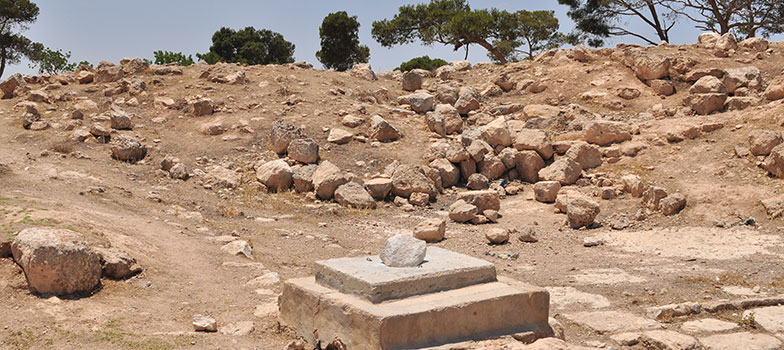
At the Monastery of St Theodosios the Cenobiarch and at Kalamon Lavra
Holy Theognios was convinced by the words of the Holy and wise Elder to abandon his "idle tasks"; he preferred the "good portion" of Mary instead of that of Martha and so he entered the desert in the year 465, where he remained for many years close to St Theodosios the Cenobiarch. However, some affliction of inflammation and blood haemorrhage in his legs forced him, after medical advice, to relocate to the area of the Jordan River at the Lavra Monastery of Kalamon. Having been cured, he remained in a cave where he prayed and carried out his daily monastic manual tasks, wetting the toil of his hands with the tears of mourning that God loves. A very large snake that also lived in the cave prior to the arrival of Theognios received the blessing from Holy Theognios to continue living there with him, without even Theognios fearing the snake nor the snake bothering Theognios.
At the mountains near the Monastery of Abba Theodosios
God’s providence in a short time had guided Holy Theognios to relocate to the place where he would later build his Monastery. Having found a cave he settled there being content with a little bread, some locusts and a little water, giving all his attention to the battle against the cunning demons that were attacking him with unclean thoughts. His life there comprised of peace, asceticism, fasting, sleeping on the bare ground, lamentation, sleeplessness and continuous kneeling and spiritual study. Τhanks to this, he emerged as the "earthly light from the cave" having reached the age of 50 years in the year 475. Due to his reputation, many came to him with their afflictions and they would leave with joy having received spiritual guidance and comforting.
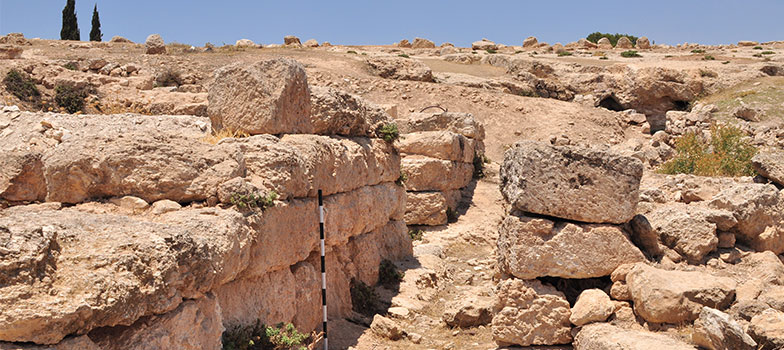
The establishment of the Monastery of Holy Theognios
The virtue of Holy Theognios that had contributed to his victory in the battle against the demons, had gathered close to him Christ-loving men who convinced him to build a small tower and to keep them close to him. Despite many of them wishing to stay close to him, Theognios didn’t want to dwell with a large crowd; he kept only a few of them and with the fear of God they lived coenobitically (monastically), fulfilling their ascetic responsibilities.
The Ordination of Saint Theognios as Bishop in Betylion
After some time had passed, a number of people persuaded Patriarch Ilias, of Jerusalem, to consecrate Theognios, against the Saint’s own will, as Bishop of a very small seaside city called Betylion, near Gaza, some 90 miles from Jerusalem. Holy Theognios shared his time between Betylion and his Monastery where he would visit occasionally staying with his beloved spiritual children. The Church of the Monastery, originally small in size, had been enlarged 10 years prior to the repose of Saint Theognios, when the number of devout monks increased.
Holy Theognios, coming from Betylion to his humble and small cell inside the Monastery, was used to saying: "Hail the King’s palace! I indeed consider a King’s palace this ancient house of mine; and like one escaped from a storm, I resort to the port of my cell, so that I can re-dock again to my previous orderliness of my mind".
One of the brethren once told him: "You, Father, in your advanced age and your dominance against the hostile passions, I don’t think that any spiritual harm can approach you, but both here, just as in your city, you maintain the same state of your spirit". Then the Saint, a true monk, responded saying: "Believe me my child, that until the day comes that my soul will depart from my body, there is no assurance, there exists no bravery or courage, because we are robed in a physical body and we walk amid snares fearing whether we will be trapped".
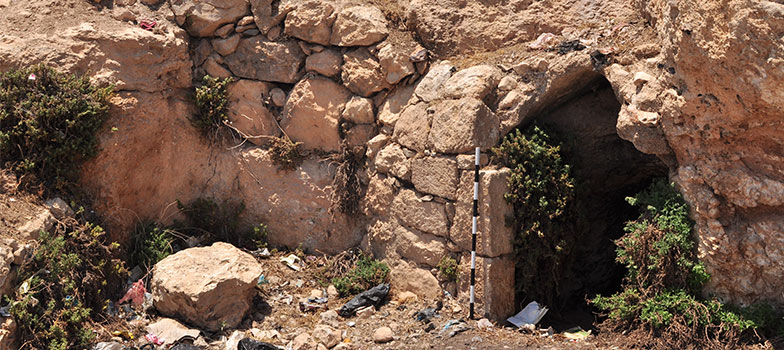
Miracles of the Holy one while he lived
The miracles of the Saintly Bishop of Betylion spread to Gaza, Ascalon (an ancient city of South Palestine) and Caesarea. At the port of Gaza, called Mayouma, two ships were built that belonged to God-fearing people. However, when the owners wanted to move their ships from their places into the sea, due to demonic influence, from magic, it was not possible for them, not even with the help of two hundred people who tried for many days. The Holy Bishop calling on the name of Christ and circling the ships three times, ordered thirty workers to launch the ships and even though he distanced himself purposely towards Ascalon in order to escape people’s praise, the ships finally were launched easily.
The crowd then ran towards Ascalon, where the Holy one lived temporarily, in order to bow down to him in praise and thank him with gifts. Amongst those people a woman who was a widow suffering from cataracts due to her tears of mourning, was cured immediately after her eyes touched the holy forehead of Theognios. Because of this incredible healing, the rush of the crowd out of admiration was so great that the Holy one was almost in danger. In Caesarea, the Holy one cured the spouse of a ruler suffering from breast cancer, which many doctors previously couldn’t manage to cure. The Holy one’s treatment comprised of three things —bending down on his knees, tears and the rendering of blessed oil on the place of ailment.
The miracle that the Holy Theognios did at Betylion however is the most miraculous of all, and it made him known throughout all of the Eastern Empire. The sea at Betylion, for some time rising and gradually surging over the coastline was threatening to destroy the city with violent waves. This occurred of course through God’s Providence so that the inhabitants may turn away from sin, but also so that the holiness of Bishop Theognios may be evident. The inhabitants pleaded with him with tears in order to prevent this harm and he, the true servant of merciful Christ, went down with the people to the shore. After having prayed, he erected a Cross in that place and said to the people present "Because we always enjoy the help of the Master of all, as much as the sea becomes aggravated, only up until this Cross will the water reach, so therefore live without fear my children, fearing only the possibility of sinning. Fear not though at all the threat of the sea". From that moment, the sea remained within the boundary erected by Holy Theognios.
The miracles of the Holy one are beyond counting and explanation – release from illnesses and curing of the dying, release from sterility of many women and preventing of theft - are some of the miracles of the man of God, he who has reached the apex of righteousness, sincere and selfless love and charity more than all.
The accident of Theognios and his healing
But for reasons that Christ knows, He sometimes allows His servants to suffer from the devil's ferocity.
While the Holy one was preparing to return once more from Betylion to his Monastery, as he was used to, for the sake of reclusive quietness and prayer, while staying overnight in the Holy City of Jerusalem, Satan appeared in his sleep and said, "Because you have a purpose to visit your Monastery after a long time, and you are pleased regarding this, I will turn your joy into mourning." And indeed, while travelling to the Monastery very early in the morning on a donkey followed by two companions, opposite the Monastery of the blessed Abba Eustathios, the animal slumped and Theognios broke his leg. Arriving with great difficulty and pain to the Monastery, the Holy one was moaning, and his Monks were caught up in sorrow instead of the expected gladness. Two days after his medical care and the dressing of his leg with a splint, while the Saint was lying in bitter pain, an Angel of the Lord came to him at night and healed him with the following words and a calm voice: "Your pain has ceased, do not be afraid at all, you are healed." The Angel immediately disappeared and Theognios called the Fathers and after telling them everything, he tried to see whether he could walk. His leg indeed was completely healed and in a few days he returned safely to Betylion. During the time of his illness, from the time the doctor came up until the Angel's visit, a beautiful pigeon was visible in the Monastery, sometimes flying over the Monastery, sometimes sitting quietly at the eastern entrance of the Holy one's cell near his feet, until the time when Theognios was healed and the pigeon disappeared. Then the great Theognios said, "Do not be surprised, my children, that it is no more seen by us; it went away to help others."
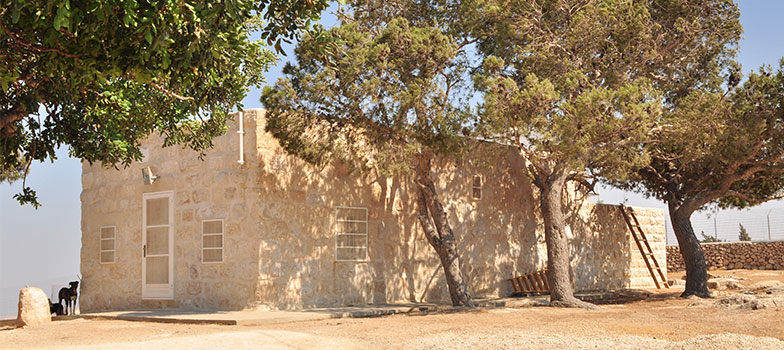
The release of the convicted clergyman
The fact that the Lord "makes His holy ones wonderful"(Ps. 4,3) is also obvious in this incident of the life of our Holy one. One clergyman from Betylion, who was accused of an offense, that could lead to loss of his life, was arrested and referred to Duke Antipatros, a man full of loathing and insolence. While everyone distanced themselves out of fear and no one dared to intercede with that abrupt official for the sake of the offending clergyman, blessed Theognios decided to go and help. His friends warned him about the character of Antipatros, and that he was very likely to fail and turn back humiliated; as it was the Duke's habit of disrespecting virtuous people. Saint Theognios replied: "I have not so far wished honour from the people; therefore I will take care for the sake of Christ's compassion to relieve the sorrow of this man who has been caught by an unexpected disaster; and if I receive disgrace and insults because of this, I will not regret it at all, but I will also be glad." Antipatros, however, seeing the Holy One approaching, ran, embraced him, and, while the Holy One spoke to him about the clergyman, invited him for an honorary meal before freeing the clergyman. The Duke revealed, with a dreadful oath, that many days ago Christ had shown him Holy Theognios in a vision - the Duke saw that they were eating together, and the Holy one said something to him. Since then, Antipatros had a great desire to meet the Holy One in person. Thus Theognios received the clergyman, liberated and acquitted, and returned to his church glorifying God.
Visits to Constantinople
The Holy Bishop, for the sake of certain affairs of his flock, who pleaded with him, travelled for the first time to Constantinople, under the rule of the Emperor Anastasios (between the years 494 to 518). Having been introduced to the Emperor, he offered him three loaves of bread wrapped in a cloth. Anastasios scornfully asked him: “Monk, what do you want me to take: only the loaves or the cloth underneath them as well?” The Holy One answered: “If you like this cloth, I will gladly give it to you.” The Emperor was amazed at the simplicity and meekness of the Saint, he received him most promisingly and fulfilled his request. But also in Constantinople, Theognios did not remain unnoticeable because of the many healings and miracles that were performed there by God's Grace through the Saint.
Later, the Holy One went back to Byzantium for similar reasons, at the beginning of Emperor Justin's reign (between the years 518-522). The reputation of the Holy One, exceeding any other bishop there, was so great that it reached the hearing of the Emperor himself. Theognios during the meeting with the Emperor not only met the request for which he travelled, but was honoured by Justin and all the Senate with great esteem and was finally sent off with respect and praise.
The divine burying of Theognios
After returning by ship to Betylion in good health and cheerful, Theognios received from God the awareness that he had reached the predetermined time of his departure from the temporary life to the immortal, eternal Kingdom. After arriving at his Monastery and welcoming his spiritual children, he soon delivered his soul as pure gold into the hands of the Saviour and the body delivered to the earth, aged ninety seven years, having crossed the sea of life as a good helmsman and having preserved the vessel of the soul loaded with the wealth of virtues. His dormition occurred on the 8th of February of the fifteenth indiction of the Emperor Justin's rule (522).
The dormition of Theognios was not left uncrowned by miracles, since "Precious in the sight of the Lord was the death of His Holy one" (Psalm 116:15). The area of the monastery suffered from drought for a long time, to the point that a week after the dormition of Theognios his monks were ready to depart because of a lack of water. Then at that moment a rain cloud came from the west and although the surrounding areas received a little drizzle, at the peak of the Monastery's mountain it rained so much that the monks, having filled the monastery's cistern, rushed to channel all the remaining water outside the wall, in order for the foundations of the monastery not to be destroyed.
And on the very day of the Holy One’s repose, the following wonderful thing happened: whilst the housekeeper of the Monastery had only two batches of bread, enough for the Monks’ consumption for fourteen days, an innumerable crowd gathered in the monastery because of the Holy One’s dormition. Nevertheless, they all ate and were filled and the remaining bread lasted the monks for another two weeks.
Our Holy One's Christ-imitating love and the divinity of his mind were so great that Paul, the biographer of Theognios, testifies: "I have seen many times blessed Theognios full of tears pleading God for the whole world ... and I have also observed that even when he was asleep, his lips were moving and whispering the Psalms.”
Paul, his biographer explained the way he reached the summit of virtue thus: "Of course, Theognios praised and admired all the virtues, but most of all, the giving up of property (material things) and self-restraint from food. Still, he was used to instructing those who were in his obedience to keep their mind in line with the holy lessons, so that through them they can obtain daily tears, for if one does not cut off the passions of the soul with zeal through the fire of their tears, they will not be able to gain the love, which is "the fullness of the law."
Amen.
Life of our Father Theognios the Bishop
(by Cyril of Scythopolis)
The wholly renowned Theognios, the great glory of the whole of Palestine, the dazzling light of the desert and brilliant luminary of the episcopacy, had as his fatherland the province of Cappadocia and the city of Ararathia, where from early youth he was instructed in monastic life. On coming to Jerusalem in the fifth year of the reign of Marcian (AD 454/5), he found the Monophysites in control of the Holy City but, since he refused to be seduced by their irrational opposition and love of turmoil, he attached himself to a virtuous lady, protected by the Holy Spirit, called Flavia, who at this time was founding near the Mount of Olives a monastery and church of the saintly martyr Julian. She received him and, having tested him for a considerable time and found him reliable and virtuous, made him administrator of her monastery. She herself migrated from Palestine to the land that had borne her, because of the needs of the church she had built, and died in her fatherland. At this the wholly renowned Theognios by forced by almost the whole community to become superior of the church. In fear of the danger of exercising authority, he fled to the desert.
He came to the thrice blessed Abba Theodosios and stayed with him for a considerable time. He illuminated all the community by the luster of his life and became outstanding in monastic attainments, so that all who saw his fine works glorified the Father in heaven. But although he was praised by all and admired for his blameless conduct and holiness of life, he himself was afraid of the harm his soul would naturally suffer from praise and human glory; at the same time he saw that the monastery, with the help of God was growing gradually in size and wealth, and was worried about the turmoil that arises from distraction. Consequently he withdrew to the district around the monastery and, on finding a cave, settled in it and lived there in solitude for some time. Becoming a temple of the all-Holy Spirit and being clothed with power from on high, he worked extraordinary cures of chronic illnesses and performed numerous miracles. Becoming famous as a result, he founded for himself, in gradual stages, a famous coenobium.
After some time had passed, Archbishop Elias heard about him and ordained him bishop of Betylion, which is a small seaside town ninety miles distant from the Holy City (Jerusalem); the godly Theognios unwillingly accepted episcopal office. When he had been some time in the said town, the adjacent sea overpassed its bounds and poured towards the town, threatening to uproot it and destroy it by force, God having doubtless ordained this in order to chastise the inhabitants and display the divine grace of Theognios. Seized with terror as they saw the sea surge upwards, they fled to the righteous one, and begged him to curb this great onset by prayer. Yielding to their repeated entreaty, the great champion of piety Theognios came to the shore and, going into the water, stuck in a cross at the original bounds of the sea, while uttering the scriptural saying addressed to the sea: “Thus says the Lord: You shall come as far as this cross, and shall go no further, and here you shall break your swelling waves” (Job 38, 11). Then having stuck in the cross, he returned. The sea immediately returned to its own bounds; and to this day, however fiercely it rages, when it touches the cross stuck by the righteous one, it is curbed and goes back.
But what need have I of further words about the famous Theognios, especially since Abba Paul, hermit of the city of Elusa, a man radiant in monastic virtues and orthodox doctrines who illuminates our godly steps by his life and teaching, has preceded me in writing the life of the same blessed Theognios both accurately and comprehensively?
The great Theognios, having by his own life given luster to the monastic order and mode of life and adorned the episcopal see by spiritual feats and divine charisms, thereby distinguishing himself greatly and brilliantly in both orders, went up to his own monastery in the desert at the end of his life, God having presumably revealed to him the time of his death. After a short illness, he passed to the life without pain or turmoil, the abode of all those who truly rejoice.
Amen.



